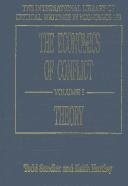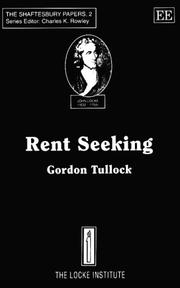| Listing 1 - 10 of 109 | << page >> |
Sort by
|
Book
ISBN: 1782544941 Year: 2015 Publisher: Northampton, Massachusetts : Edward Elgar Publishing,
Abstract | Keywords | Export | Availability | Bookmark
 Loading...
Loading...Choose an application
- Reference Manager
- EndNote
- RefWorks (Direct export to RefWorks)
The quest for benefit from existing wealth or by seeking privileged benefit through influence over policy is known as rent seeking. Much rent seeking activity involves government and political decisions and is therefore in the domain of political economy, although it can also take place in personal relations and within firms and bureaucracies. Rent seeking, which involves the unproductive use of resources, is however primarily associated with policies that create rents as well as rent extraction or political benefit for the creators of rents. The contributions in this outstanding volume provid
Book
ISBN: 0429329164 1000222462 Year: 2021 Publisher: London ; New York, New York : Routledge,
Abstract | Keywords | Export | Availability | Bookmark
 Loading...
Loading...Choose an application
- Reference Manager
- EndNote
- RefWorks (Direct export to RefWorks)
"Rent-Seeking and Human Capital: How the Hunt for Rents is Changing our Economic and Political Landscape explores the debates around rent seeking and contextualizes it within the capitalist economy. It is vital that the field of economics does a better job of analyzing and making policy recommendations that reduce the opportunities and rewards for rent seeking, generating returns from the redistribution of wealth rather than wealth creation. This short and provocative book addresses the key questions: who are the rent seekers? What do they do? Where do they come from? What are the consequences of rent seeking for the broader economy? And finally, what should policymakers do about them? The chapters examine the existing literature on rent seeking, including looking at the differences between rent seeking, economic rent and unproductive labor. The work provides an in-depth look at the case of the impact of rent seeking degrees in the US, particularly Business and Law, and explores potential policy remedies such as a wealth tax or changes to the rules on financial transactions and patents. This text provides an important intervention on rent-seeking for students and scholars of heterodox economics, political economy, inequality, and anyone interested in the shape of the modern capitalist economy. Kurt von Seekamm Jr. is Assistant Professor in the Department of Economics at Salem State University, USA"--
Book
ISBN: 303076303X 3030763021 Year: 2021 Publisher: Cham, Switzerland : Palgrave Macmillan,
Abstract | Keywords | Export | Availability | Bookmark
 Loading...
Loading...Choose an application
- Reference Manager
- EndNote
- RefWorks (Direct export to RefWorks)
Rent (Economic theory) --- Economic rent --- Ground-rent --- Economics --- Land use --- Rent seeking
Book
Year: 2018 Publisher: Washington, D.C. : The World Bank,
Abstract | Keywords | Export | Availability | Bookmark
 Loading...
Loading...Choose an application
- Reference Manager
- EndNote
- RefWorks (Direct export to RefWorks)
Does decentralizing the allocation of public resources reduce rent-seeking and improve equity? This paper studies a governance reform in Pakistan's vast Indus Basin irrigation system. Using canal discharge measurements across all of Punjab province, the analysis finds that water theft increased on channels taken over by local farmer organizations compared with channels that remained bureaucratically managed, leading to substantial wealth redistribution. The increase in water theft was greater along channels with larger landowners situated upstream. These findings are consistent with a model in which decentralization accentuates the political power of local elites by shifting the arena in which water rights are contested.
Bureaucracy --- Elite Capture --- Governance --- Inequality --- Landownership Inequality --- Poverty Reduction --- Rent-Seeking
Book
Year: 2018 Publisher: Washington, D.C. : The World Bank,
Abstract | Keywords | Export | Availability | Bookmark
 Loading...
Loading...Choose an application
- Reference Manager
- EndNote
- RefWorks (Direct export to RefWorks)
In many developing countries (and beyond), public sector workers are not just simply implementers of policies designed by the politicians in charge of supervising them-so called agents and principals, respectively. Public sector workers can have the power to influence whether politicians are elected, thereby influencing whether policies to improve service delivery are adopted and how they are implemented, if at all. This has implications for the quality of public services: if the main purpose of the relationship between politicians and public servants is not to deliver quality public services, but rather to share rents accruing from public office, then service delivery outcomes are likely to be poor. This paper reviews the consequences of such clientelism for improving service delivery, and examines efforts to break from this "bad" equilibrium, at the local and national levels.
Clientelism --- Governance --- National Governance --- Public Sector Development --- Public Sector Reform --- Rent Seeking --- Service Delivery
Book
Year: 2018 Publisher: Washington, D.C. : The World Bank,
Abstract | Keywords | Export | Availability | Bookmark
 Loading...
Loading...Choose an application
- Reference Manager
- EndNote
- RefWorks (Direct export to RefWorks)
Surface irrigation is a common pool resource characterized by asymmetric appropriation opportunities across upstream and downstream water users. Large canal systems are also predominantly managed by the state. This paper studies water allocation under an irrigation bureaucracy subject to corruption and rent-seeking. Data on the landholdings and political influence of nearly a quarter million irrigators in Pakistan's vast Indus Basin watershed allow the construction of a novel index of lobbying power. Consistent with a model of misgovernance, the decline in water availability and land values from channel head to tail is accentuated along canals having greater lobbying power at the head than at the tail.
Bureaucracy --- Common Property Resource --- Corruption --- Energy --- Governance --- Irrigation --- Poverty Reduction --- Rent-Seeking --- Water Use
Book
ISBN: 1487518412 1487518404 Year: 2022 Publisher: Toronto, Ontario : University of Toronto Press,
Abstract | Keywords | Export | Availability | Bookmark
 Loading...
Loading...Choose an application
- Reference Manager
- EndNote
- RefWorks (Direct export to RefWorks)
This book sheds light on the interaction between international agricultural trade and domestic foreign policy.
Agriculture and state --- Agriculture --- Economic aspects --- GMOs. --- agricultural and food policy. --- agricultural trade. --- climate change. --- rent-seeking behaviour.

Abstract | Keywords | Export | Availability | Bookmark
 Loading...
Loading...Choose an application
- Reference Manager
- EndNote
- RefWorks (Direct export to RefWorks)
ECONOMIC ASPECTS -- 327.6 --- -Political violence --- -Rent (Economic theory) --- Economic rent --- Ground-rent --- Rent seeking --- Rent (Economic theory). --- Game theory. --- Peace --- Political violence --- Security, International --- War --- Economic aspects.

ISBN: 1852788704 Year: 1993 Publisher: Aldershot Elgar
Abstract | Keywords | Export | Availability | Bookmark
 Loading...
Loading...Choose an application
- Reference Manager
- EndNote
- RefWorks (Direct export to RefWorks)
Rent (Economic theory) --- 347.453 --- Economic rent --- Ground-rent --- Economics --- Land use --- Rent seeking --- 347.453 Huur. Huurovereenkomst. Verhuren --- Huur. Huurovereenkomst. Verhuren --- Microeconomics
Book
Year: 2016 Publisher: Washington, D.C. : The World Bank,
Abstract | Keywords | Export | Availability | Bookmark
 Loading...
Loading...Choose an application
- Reference Manager
- EndNote
- RefWorks (Direct export to RefWorks)
This study investigates the existence of political rents in bank lending, using a comprehensive loan-level data set of the universe of commercial loans in Mexico from 2003 to 2012. Identification relies on changes in the state of origin of a senate committee chairman as a source of exogenous variation in firms' political relationship. The study finds that banks offer favorable loan terms to politically connected firms with larger loan quantities, lower loan spreads, longer maturities, and lower collateral requirements. Furthermore, political loans exhibit higher default rates. To isolate the bank supply channel, a rich set of fixed-effects is included with various specifications. The favorable lending increases with the strength of a firm's political connection, varies gradually along the political cycle, and is mainly offered by large and domestic banks. Consistent with the quid pro quo hypothesis, the study finds that banks that extend political loans receive significantly more government borrowings with better credit quality. The study also shows that the greater credit supply due to political connection leads to a large and significant increase in firm-level employment and assets. The study provides estimates of the total social cost of political lending and net revenue for banks that are engaged in rent provision activity. Finally, a series of robustness tests are performed to rule out alternative mechanisms and explanations.
| Listing 1 - 10 of 109 | << page >> |
Sort by
|

 Search
Search Feedback
Feedback About UniCat
About UniCat  Help
Help News
News